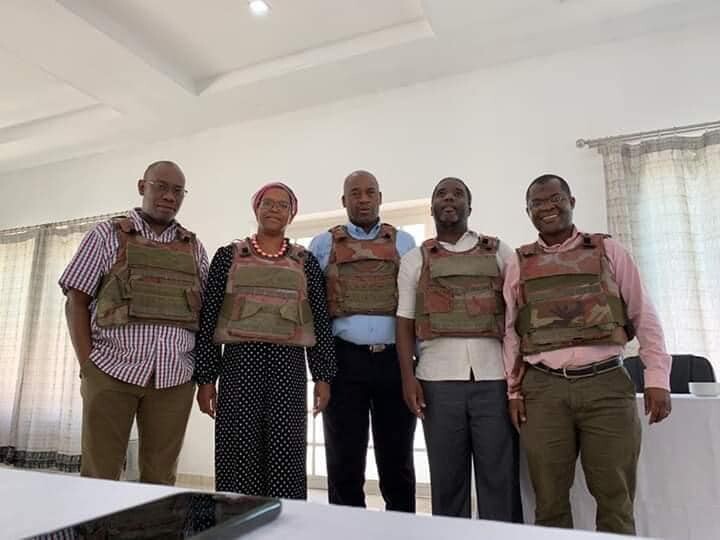
Image: skyscrapercity.com
“A new type of thinking is essential if mankind is to survive and move toward higher levels.” – Albert Einstein
Introduction
Have you ever wondered why Malawi, despite being independent for 59 years, remains one of the poorest countries in the world? According to Action on Poverty, over half of the population lives in dire poverty. However, Malawi is blessed with abundant resources, including beautiful mountains, fresh lakes like Lake Malawi, minerals, fertile arable land, game reserves, national parks, and brilliant human resources. Ironically, some of these intellectuals have chosen to contribute to the economies of foreign countries as expatriates or economic refugees. Where did Malawi go wrong that it remains poor? One can’t help but wonder, who cursed this country?
In this article, we will delve into the plight of Malawi’s broken systems and explore the root causes of our country’s lack of progress. Subsequently, recommendations will be provided for the way forward.
Malawi’s Broken Systems
The main reason why Malawi remains a poor and struggling state is that it has corruptly and blindly embraced broken systems. Our political, social, and economic systems are no longer working for the common good; they have been hijacked by special interests, particularly the elite, who prioritize their own gain. The result is pandemonium and total chaos.
Malawi will continue to move towards becoming a failed state until all broken systems are thoroughly overhauled and replaced with result-oriented and efficient ones. A failed state is one that can no longer sustain the conditions necessary for its own existence. The subsequent sections will discuss the broken systems in Malawi.
Education System
It is not surprising that the World Bank reported Malawi’s literacy rate among adults at 67.3% in 2021. Additionally, it is alarming that many graduates from our education system remain unemployed. There seems to be a significant gap between what the education system offers and the skills required by industries. Corruption and theft incidents involving public servants are prevalent among the educated elite. One has to wonder if our education system strives to instill values of integrity in its pedagogical programs.
Healthcare System
Sadly, many Malawians are losing their lives in public hospitals due to avoidable and preventable causes. Shortages of essential drugs in public health facilities have become commonplace.
Moreover, how can a robust healthcare system allow the proliferation of fake doctors and nurses in public hospitals? Doesn’t this scenario put the lives of innocent citizens at risk? When politicians, such as the wife of the Vice President, Mary Chilima, require specialized treatment abroad, it serves as a wake-up call that Malawi needs to upgrade its healthcare system. Obviously, a local villager in Nambazo or Bolero, for example, cannot afford such treatment abroad, resulting in tragic deaths.
Agriculture
As an agro-based country, Malawi remains poor for various reasons. Firstly, it relies heavily on rain-fed water. Secondly, the current subsistence farming practices, which employ archaic tools such as hoes, do not produce enough harvests to feed the nation or export surpluses. Thirdly, the government’s Agricultural Input Subsidy Programme (AIP), while seemingly fruitful in the short term, is not a sustainable solution. Lastly, our politicians lack patriotism when it comes to improving the status of agriculture in the country. For instance, during Peter Mutharika’s regime, politicians dubiously purchased tractors at giveaway prices, intended for local farmers.
Currently, under Chakwera’s regime, the government has selfishly chosen East Bridge Estate, a Romanian company, to supply 600,000 metric tonnes (MT) of fertilizer. Many Malawians are skeptical about the credibility of this company. A few months ago, the same Chakwera government paid K750 million Kwacha to a United Kingdom-based butchery company for fertilizer supply, which was never delivered, and the money is yet to be recovered.
Tourism Industry
It is disheartening to note that Malawi has not been able to fully capitalize on its natural resources to develop its tourism sector. In countries like Germany and Britain, artificial dams are even created for recreational purposes. Yet in Malawi, we have natural lakes and rivers that are not being optimally utilized.
The Presidency
As Alexander the Great once said, “an army of sheep led by a lion is better than an army of lions led by a sheep.” This statement emphasizes the importance of visionary leadership. Unfortunately, Malawian presidents have prioritized their own power and reelection campaigns over improving the lives of their citizens. From the moment they assume the presidential crown, they focus on securing a second term, disregarding the aspirations and expectations of the people.
Moreover, the constant antagonism between the President and the Vice President in almost all regimes has been detrimental to the nation. Our constitution bears some responsibility for diluting the role of the Vice President as merely an office in waiting for a presidential vacancy. It is unfortunate that our constitution puts the President’s position at the mercy of the Vice President.
The Legislature
There are numerous outdated laws that require review by the National Assembly, including the death penalty.
It is disheartening to see the declining standard of deliberations in our National Assembly. It lacks the seriousness it deserves. How is it possible for the entire 2023 National budget to be passed within 120 minutes? How can the Speaker of the National Assembly participate in the election of the Leader of the Opposition? Such occurrences are unheard of in other parts of the world. Additionally, how can the National Assembly allow the Judiciary to dictate the procedures for enacting laws, as was the case with the 50%+1 majority requirement?
The Judiciary
The leaked audio of the ACB Director General suggests that the Judiciary is corrupt and interferes with bringing corruption suspects to justice. The audio also alleges that the verdict in the 2020 presidential elections case was a clear example of a miscarriage of justice.
Economic Policy
Malawi’s status as a poor nation is not a result of chance. According to the World Bank, weak fiscal management and economic policies implemented by the Malawian Government have led to recurring and significant fiscal deficits. High taxes and both domestic and foreign borrowing have become survival strategies.
Corruption as an Organized Crime
Numerous organized networks have been established to defraud the government’s coffers. These networks engage in various notorious crimes, including burglary, theft, corruption, money laundering, and operating unregistered brothels. Shockingly, individuals involved in these vices come from all walks of life, including prominent politicians, highly revered religious figures, magistrates, judges, police officers, and even staff members of the Anti-Corruption Bureau (ACB).
There are numerous examples to substantiate this claim. It is well-known that former minister Ralph Kasambara was convicted of conspiracy to murder, and a Catholic priest, the late Thomas Muhosha, was convicted of killing an albino. Even the Chief Justice, Rezine Mzikamanda, has acknowledged the rampant corruption within the Judiciary. We must not forget that the former Director General of the ACB, Reyneck Matemba, is also facing corruption charges.
Law Enforcement and Investigation Agencies
It is widely believed that criminality and corruption have infiltrated Malawi’s law enforcement and investigation agencies, including the Malawi Police Service (MPS), Malawi Defense Force (MDF), Anti-Corruption Bureau (ACB), Road Traffic Department, and Immigration Department.

For example, there are police officers facing murder charges for the killing of a suspect, Lule Buleya, while in police custody. Some of the officers implicated in this case include Paul Chipole, Ikram Malata, Richard Kalawire, Innocent Wanda, Ronenx Kapesa, and Robert Tchaka.
Furthermore, the MPS has been unable to apprehend the murderers of Issa Njauju, a senior ACB officer, for nearly a decade. There are also reports of corruption involving some ACB staff members.
These incidents have raised serious concerns about the ability of Malawi’s law enforcement and investigation agencies to effectively carry out their duties. This has had a negative impact on public safety and confidence in the government.
Technology
With the rapid advancements in technology, criminals have become increasingly cunning, utilizing the same technology to defraud government funds. It is no secret that the Accountant General’s office has become a hotbed for technological abuse and fraudulent activities. In 2022, the Fiscal Police arrested 17 accountants on fraud charges.
To address this issue, the government of Malawi should invest in training cybercrime specialists capable of countering and exposing cybercrime activities within government ministries, departments, and agencies. The government should also embrace technology in both the public and private sectors, as this will help to reduce the opportunities for criminals to exploit outdated systems.
Fixing the Broken Systems
Addressing the broken systems requires redefining government priorities to ensure the well-being of citizens and the productivity and profitability of businesses. It also entails acknowledging past failures and making a genuine commitment to transforming these shortcomings into success stories. The following recommendations are proposed to fix the respective broken systems:
Education
- Make primary school education compulsory to reduce high illiteracy levels that unscrupulous politicians exploit for electoral gains.
- Revamp the entire education curriculum at all levels to align with the dynamic needs of industries.
- Incorporate integrity and entrepreneurial values into the syllabi to combat unemployment and rampant corruption.
Health
- Ensure adequate funding for the healthcare system to promote a healthy nation.
- Ensure access to quality healthcare for all Malawians by ensuring the availability of essential drugs in all public health facilities.
- Upgrade public hospitals to provide specialized treatment within the country, reducing the need for citizens to seek medical care abroad.
Agriculture
- Prioritize and promote irrigation initiatives nationwide.
- Commercialize agriculture.
- Modernize agricultural practices.
- Diversify crop and animal farming.
- Implement sustainable agricultural policies.
Tourism
- Increase the visibility and marketability of Malawi’s natural resources.
- Foster public-private partnerships to enhance the hospitality industry.
- Improve road networks and amenities to attract potential tourists.
- Ensure a reliable supply of electricity, internet, and cellular services to meet the expectations of tourists.
Organized Crime
- Strong and committed political leadership is essential for coordinating multisectoral efforts to combat organized crime.
Presidency
- Amend the Malawi Constitution to allow the Vice President to assume the presidency for a maximum of three months in the event of a vacancy, during which fresh presidential elections must be conducted.
- Empower the legal process to impeach underperforming presidents in accordance with the law.
The Legislature
- Review and update outdated and archaic laws.
- Implement measures to prevent politicization of the National Assembly, such as excluding the Speaker from endorsing the Leader of the Opposition.
Economic Policy
- The Executive branch of government should effectively communicate its economic policies to the citizens.
The Judiciary
- Suspend judges and magistrates suspected of corruption to facilitate impartial investigations.
Law Enforcement Agencies
- Suspend all personnel in MPS, MDF, ACB, and other implicated departments involved in corruption for thorough investigations.
Conclusion
Malawi’s status as a poor nation is a result of its broken systems that no longer serve the common good. The recommendations outlined in this article aim to address these broken systems and set Malawi on a path towards prosperity.
Feedback, email: [email protected]













